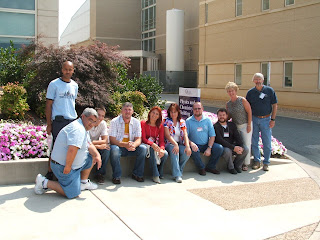The greatest benefit of studying science, and I would argue physics or astronomy in particular, is that it prepares you for almost anything afterwards. If my life after JMU (and that of many of my friends) is any indication, then this is indeed true.
Physics majors are among the highest scorers on the GRE, MCAT, LSAT, and GMAT (which are the standardized tests to enter graduate school, medical school, law school, and business school, respectively). This is not because the smartest freshmen decide to take up physics (definitely not me), but rather that a scientifically and mathematically rigorous education provides people with unmatched skills in reasoning and analysis. It is fairly straightforward (though tedious) to write a paper for Political Science or History. However, it requires skill and ingenuity to craft from scratch an original solution to an abstract unsolved problem. (And that feeling of working weeks upon weeks on a research project and finally getting an answer, discovering something nobody else knows, is simply incredible.) It is these skills that you develop through research experience and problem set after problem set (after problem set after problem set…) that prepares you for almost any path afterwards, like it did for me. Despite my words above, it is my real experience as a JMU Physics & Astronomy major and the implications that it had for my life afterwards that reveal how versatile and indispensible a physics education truly is.
I decided to do physics on a whim. I was undecided as an incoming freshmen and hated being as much. So, I closed my eyes and randomly pressed my finger to the page (literally). At first, I struggled to break into the middle of the pack. I debated leaving the major for something easier…maybe Business or ISAT. However, the smallness of the major and the general approachability and likeability of the professors convinced me to stick around (I had Dr. Hughes, Dr. Utter, and Dr. Whisnant my first semester—I was spoiled from the start). The professors are what make JMU Physics & Astronomy so great. They avidly try to get to know you, make sure you succeed, and get you in the lab (I have actually witnessed fights over which professor gets which student for research). The relationship between the faculty and students is something I have seen nowhere else at JMU. My professors definitely had a genuine interest in me, and it paid off. After earning my first ‘A’ in Phys 240, I was hooked. The trend continued for the next four years while I studied the intricacies of everything from quantum mechanics to the life cycles of stars. But something I consider more valuable than what I learned at JMU is what I learned in the labs during the summers.
I started researching early, the second semester of my freshman year, and it was probably one of the best decisions I made at JMU. I researched in nuclear physics, materials science, condensed-matter physics, and cosmology. Researching paid really well and allowed me to work at JMU, NIST in Colorado, NASA, and Northwestern University. I worked on everything from a hydrogen distillery operating at -425 degrees Fahrenheit to a 2000 Watt laser with a beam you couldn’t even see (a very scary thought). The diversity of my experiences, beyond any doubt, gave me a unique and unparalleled undergraduate experience. It also gave me an appreciation for science that I decided to share with others after I graduated.
After earning my diploma, I decided to take the altruistic route as a high school teacher in New Orleans. My familiarity with the application of math allowed me to enthrall my students and enrich their learning experience. Afterwards, I moved into the business world, working as an IT consultant. Although unfamiliar with business in general, my experience with practical problem-solving, research, and computer programming allowed me to maintain pace with my peers conventionally educated in business.
Despite leaving academia, my love for research has not waned. I have just been offered one of my dream jobs as a nuclear forensic scientist (tracing illicit nuclear material) in the SF Bay Area. This job will culminate with my entrance to graduate school, where I will earn my Ph.D. in nuclear engineering and (hopefully) begin a fruitful scientific career at the International Atomic Energy Agency in nuclear security.
Many students were scared off from physics during high school because they had terrible teachers. The opposite is the case here. The professors at JMU (again, the department’s best asset) are clamored for because they can make the subject clear (but not simple—we’re not at Hogwarts). It is an intimidating major, but without question one of the most rewarding JMU offers. I would not have the same appreciation for my education if my finger had landed elsewhere on the page. Choosing to study physics, without a doubt, was the best decision I made at JMU, and it opened more doors than I ever could have imagined.
-------


